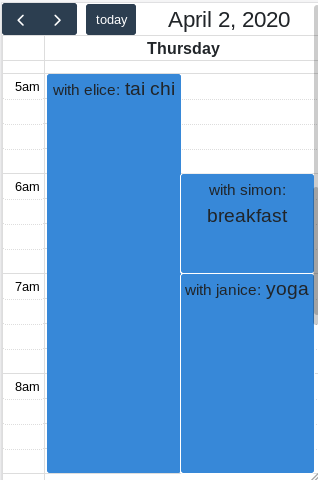tcal - The Today Calendar
As part of our focus to develop personalised technology, we have been working on tcal, the Today Calendar. tcal is a website that aims to help people manage the structure of their day by presenting a simple view of the events of the day. tcal mimics manual physical desktop calendars such as the "day at a glance" flip calenders that were often used in offices. Members of their family also have access to tcal with the ability to create, edit and delete events. This allows events to be updated and changed remotely, something that is not possible with manual physical calendars.
tcal has been based on the free and open-source fullcalendar javascript library. Our reason for using this type of library is to allow people to easily replicate tcal and to support personalisation of its functionality.
Key Functionality
People will access to manage the calendar can add, move and resize events; edit events; and delete events. They can also add in weekly or fortnightly recurring events.
tcal also has functionality that can allow people to access their calendar without requiring the use of a password should this be helpful.
 Smart Home Connection
Smart Home Connection
It is possible to create view-only access that presents a daily agenda and the ability to scroll day-by-day to see future agendas. Alternatively full-access allows people to navigate by month, week, day or list view.
The daily agenda view automatically updates regularly and can be opened on a tablet or phone so that it can be placed onto a desk in the same way a manual calendar might or even hung where a wall calendar might be placed.
tcal can connect to the Home Assistant smart-home system (something that we have also been working on in the Florence project), a system that can be installed onto a Raspberry Pi and can operate without needing to connect to a commercial or cloud-based smart-home system. This integration allows the smart-home system to be 'notified' by tcal when events are occurring so that functions of the smart-home can act on these events. An example might be controlling in-home lighting to provide reminders of events occurring in a day.
We see this integration as being a key feature of tcal as it supports smart-home systems to become aware of the real-world context. It also supports the development of the Language Bank, another key area of focus in the Florence Project that aims to support communication.
Feedback
We are keen to hear any feedback or suggestions for the future development of tcal. Is there something that you do in managing the structure of your day that you think tcal should also do? Is there a specific feature that would be useful to you?
Please send us your thoughts to the email florence@eecs.uq.edu.au
Author: Ryan Deslandes, 5 April 2020
